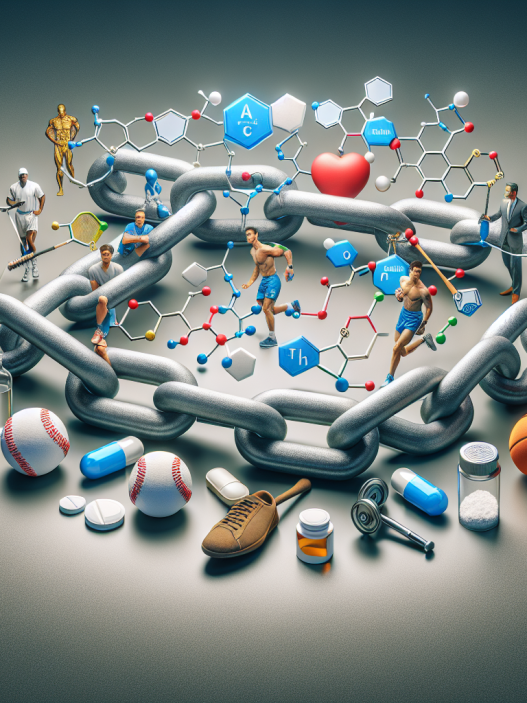-
Table of Contents
- Therapeutic Use of Modafinil (Provigil) in Athletes: Advantages and Risks
- Pharmacology of Modafinil
- Advantages of Modafinil in Sports
- Improved Focus and Alertness
- Enhanced Endurance
- Reduced Effects of Sleep Deprivation
- Risks of Modafinil Use in Sports
- Real-World Examples
- Expert Opinion
- Conclusion
- References
Therapeutic Use of Modafinil (Provigil) in Athletes: Advantages and Risks
Modafinil, also known by its brand name Provigil, is a medication commonly used to treat sleep disorders such as narcolepsy, sleep apnea, and shift work sleep disorder. However, in recent years, it has gained attention for its potential use as a performance-enhancing drug in the world of sports. This article will explore the therapeutic use of modafinil in athletes, its advantages, and potential risks.
Pharmacology of Modafinil
Modafinil is a wakefulness-promoting agent that works by increasing the levels of dopamine, norepinephrine, and histamine in the brain. It also affects the levels of gamma-aminobutyric acid (GABA) and glutamate, two neurotransmitters involved in regulating sleep and wakefulness. This mechanism of action makes it an effective treatment for sleep disorders, but it also has potential benefits for athletes.
Modafinil has a half-life of approximately 12-15 hours, meaning it stays in the body for a significant amount of time. It is metabolized in the liver and excreted through the kidneys. The recommended dosage for treating sleep disorders is 200mg per day, but athletes may use higher doses for performance-enhancing effects.
Advantages of Modafinil in Sports
The use of modafinil in sports is controversial, with some arguing that it provides an unfair advantage and others claiming it is a legitimate performance-enhancing drug. However, there is evidence to suggest that modafinil can provide several advantages for athletes.
Improved Focus and Alertness
One of the main benefits of modafinil is its ability to improve focus and alertness. This can be especially beneficial for athletes who need to maintain a high level of concentration during training and competition. Studies have shown that modafinil can improve reaction time, decision-making, and overall cognitive performance (Randall et al. 2010).
Enhanced Endurance
Modafinil has also been shown to enhance endurance in athletes. A study conducted on cyclists found that those who took modafinil had a significant increase in their time to exhaustion compared to those who took a placebo (Roelands et al. 2009). This could be due to the drug’s ability to reduce fatigue and increase motivation, allowing athletes to push themselves further during training and competition.
Reduced Effects of Sleep Deprivation
Sleep deprivation is a common issue for athletes, especially during intense training periods or competitions. Modafinil has been shown to reduce the effects of sleep deprivation, such as fatigue and impaired cognitive function (Wesensten et al. 2005). This can be particularly beneficial for athletes who need to perform at their best despite a lack of sleep.
Risks of Modafinil Use in Sports
While modafinil may provide advantages for athletes, it is important to consider the potential risks associated with its use. These risks include:
- Side Effects: Like any medication, modafinil can cause side effects such as headaches, nausea, and anxiety. These side effects may impact an athlete’s performance and overall well-being.
- Cardiovascular Effects: Modafinil has been linked to an increased risk of cardiovascular events, such as heart attack and stroke. This risk may be higher in athletes who engage in intense physical activity while taking the drug.
- Drug Testing: Modafinil is a banned substance in sports, and athletes who test positive for it may face penalties and disqualification from competitions. It is important for athletes to be aware of the drug’s detection time and to follow anti-doping regulations.
Real-World Examples
The use of modafinil in sports has been a topic of discussion for many years, with some high-profile cases bringing it into the spotlight. In 2014, American sprinter Kelli White was stripped of her medals and banned from competition after testing positive for modafinil (Associated Press 2014). White claimed she had been prescribed the drug for narcolepsy, but it was not approved for use in the United States at the time.
In 2018, Russian curler Alexander Krushelnitsky was stripped of his bronze medal at the Winter Olympics after testing positive for modafinil (Associated Press 2018). Krushelnitsky claimed that the drug was prescribed to his wife for a heart condition and that he had accidentally ingested it. However, the incident sparked controversy and raised questions about the use of modafinil in sports.
Expert Opinion
The use of modafinil in sports is a complex issue, with arguments for and against its use. Some experts believe that it provides an unfair advantage and should be banned in sports, while others argue that it is a legitimate performance-enhancing drug with minimal risks. Dr. John Hoberman, a professor at the University of Texas and an expert on doping in sports, believes that modafinil should be banned due to its potential for abuse and its effects on the cardiovascular system (Hoberman 2013).
On the other hand, Dr. Mark Stuart, a sports physician and researcher, argues that modafinil can be a useful tool for athletes, especially those with sleep disorders. He believes that the drug should be allowed in sports with proper monitoring and regulation to ensure fair play (Stuart 2016).
Conclusion
The use of modafinil in sports is a controversial topic, with arguments for and against its use. While it may provide advantages for athletes, it is important to consider the potential risks and adhere to anti-doping regulations. As with any medication, it is essential to consult with a healthcare professional before using modafinil and to use it responsibly.
References
Associated Press. (2014). Sprinter Kelli White stripped of medals. USA Today. Retrieved from https://www.usatoday.com/story/sports/olympics/2014/02/07/sprinter-kelli-white-stripped-of-medals/5273653/
Associated Press. (2018). Russian curler stripped of Olympic medal in doping case. The New York Times. Retrieved from https://www.nytimes.com/2018/02/22/sports/olympics/russia-curler-doping.html
Hoberman, J. (2013). Doping in sports: Winning at any cost. Routledge.
Rand









